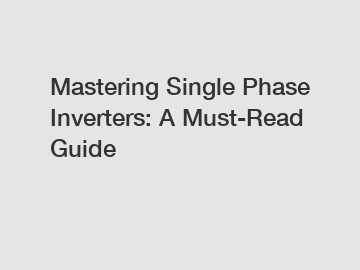Feb. 12, 2024
Energy
Mastering Single Phase Inverters: A Must-Read Guide.
Single-phase inverters play a crucial role in converting DC power from sources like solar panels or batteries into AC power that can be used by appliances and electronics. Whether you are an aspiring solar technician, an electrician, or simply interested in understanding how these devices work, mastering single-phase inverters is essential. In this guide, we will delve into the fundamentals of single-phase inverters, explore their applications, and discuss important considerations when selecting and installing them.
Understanding Single-Phase Inverters.

A single-phase inverter is a device that converts DC power into AC power with only one phase. It is commonly used in residential and small-scale commercial settings where the power demand does not exceed a certain limit. Single-phase inverters are widely deployed in solar energy systems, uninterrupted power supplies (UPS), and portable generators.
Primary Components of Single-Phase Inverters.
To understand how single-phase inverters work, it is important to familiarize yourself with their primary components:
1. DC-to-AC Converter: This component receives DC power from the input and converts it into AC power. It consists of switches that allow the flow of electrical current in the desired direction.
2. Pulse Width Modulator (PWM): The PWM controller regulates the output voltage and frequency of the AC power. By controlling the width of the pulses, it maintains the desired output waveform.
3. Transformer: The transformer in single-phase inverters adjusts the output voltage to the required level, ensuring compatibility with the electrical grid or connected appliances.
Applications of Single-Phase Inverters.
Single-phase inverters find wide applications in various industries and settings, including:
1. Residential Solar Power Systems: Single-phase inverters are commonly used in residential solar installations. They convert the DC power generated by solar panels into AC power that can be used by household appliances.
2. UPS Systems: Single-phase inverters are integral to uninterrupted power supply (UPS) systems. They ensure a seamless transition from AC power to battery backup during power outages, providing continuous power to critical equipment.
3. Small Commercial Settings: Single-phase inverters are often deployed in small businesses, offices, and retail spaces where the power demand is generally limited. They offer reliable and efficient power conversion in these settings.
Important Considerations for Selecting and Installing Single-Phase Inverters.
When selecting and installing single-phase inverters, several factors need to be considered to ensure optimal performance and safety. Here are some key considerations:
1. Power Capacity: Determine the power requirements of the appliances or electrical load that you need to support. Select an inverter with a power capacity that aligns with your needs.
2. Efficiency: Look for inverters with higher efficiency ratings to maximize overall system performance and reduce energy losses.
3. Grid Compatibility: Ensure that the inverter has the necessary certifications and compatibility with the electrical grid to comply with local regulations and safety standards.
4. Sizing and Location: Properly size the inverter for the available space and location. Consider factors such as ventilation, temperature, and wiring requirements during installation.
Master Single-Phase Inverters Today!
Mastering single-phase inverters is essential for anyone working with solar energy systems, UPS setups, or small commercial settings. By understanding their components, applications, and important considerations during selection and installation, you can ensure efficient and safe power conversion.
If you have further questions or need assistance with single-phase inverters, feel free to contact us. Our team of experts is always ready to provide guidance and support.
Contact us now to unlock the potential of single-phase inverters and enhance your power conversion knowledge!
Contact us to discuss your requirements of 3 phase inverter vs single phase inverter, industrial solar inverter, three phase inverter vs single phase. Our experienced sales team can help you identify the options that best suit your needs.
If you are interested in sending in a Guest Blogger Submission,welcome to write for us!
All Comments ( 0 )